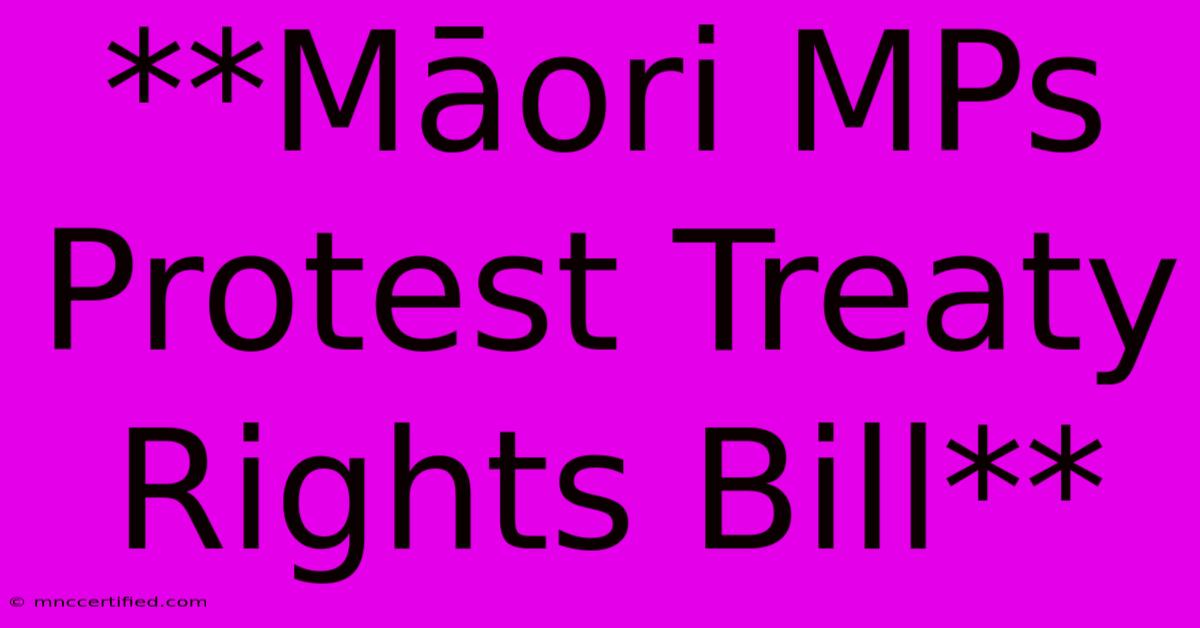**Māori MPs Protest Treaty Rights Bill**

Table of Contents
Māori MPs Protest Treaty Rights Bill: Concerns and Controversy
The proposed Treaty Rights Bill has ignited a firestorm of protest from several Māori Members of Parliament (MPs), sparking a heated debate about its implications for indigenous rights and the future of the Treaty of Waitangi. This article delves into the heart of the controversy, examining the key concerns raised by Māori MPs and analyzing the potential consequences of this legislation.
Key Concerns of Protesting Māori MPs
The core of the Māori MPs' opposition stems from concerns that the bill, in its current form, fails to adequately uphold the principles of the Treaty of Waitangi and potentially undermines Māori sovereignty. Specific concerns include:
1. Lack of Meaningful Consultation:
Many MPs argue the consultation process leading up to the bill's introduction was insufficient and lacked genuine engagement with Māori communities. They contend that the Crown failed to adequately incorporate Māori perspectives and priorities, leading to a sense of betrayal and disenfranchisement. This lack of meaningful consultation is a central point of contention.
2. Erosion of Tino Rangatiratanga:
A significant worry is the perceived erosion of tino rangatiratanga, the Māori concept of self-determination. MPs argue that the bill's provisions could limit Māori authority over their own affairs and resources, impacting their ability to govern themselves in accordance with their customs and traditions. The debate centers on whether the bill genuinely protects or undermines tino rangatiratanga.
3. Insufficient Resource Allocation:
Protesting MPs also highlight the inadequate allocation of resources to support the implementation of the bill's provisions. They argue that without sufficient funding and support, the bill's promises will remain unfulfilled, further damaging the Crown-Māori relationship. Funding and resource allocation are crucial aspects of the controversy.
4. Ambiguity and Unclear Definitions:
The bill's language is criticized for being ambiguous and lacking clear definitions of key terms, potentially leading to misinterpretations and disputes in the future. This lack of clarity raises concerns about the enforceability and practical application of the bill's provisions.
The Broader Implications of the Protest
The protest by Māori MPs is not simply a matter of parliamentary procedure; it highlights a deeper malaise in the Crown-Māori relationship. The strength of the opposition reveals a widespread feeling among some Māori that the Crown is failing to honor its obligations under the Treaty of Waitangi.
The ongoing debate carries significant implications for:
- Intergovernmental Relations: The controversy could strain the relationship between the Crown and Māori, potentially hindering progress on other important initiatives.
- Social Cohesion: The divisions highlighted by the protest threaten to exacerbate existing social tensions and impact national unity.
- International Reputation: New Zealand's commitment to upholding indigenous rights is being scrutinized on the international stage, with this protest drawing international attention.
Moving Forward: A Path to Resolution
Resolving the impasse requires a renewed commitment to genuine partnership and collaboration. This means:
- Meaningful Engagement: The Crown must engage in respectful and meaningful consultation with Māori communities to address their concerns and incorporate their perspectives.
- Transparent Processes: Future legislative processes must ensure greater transparency and accountability, fostering trust and understanding.
- Adequate Resource Allocation: Sufficient resources must be allocated to support the implementation of any legislation relating to Treaty rights.
The protest surrounding the Treaty Rights Bill represents a critical juncture in the ongoing journey towards reconciliation between the Crown and Māori. Addressing the concerns raised by Māori MPs is essential for fostering a just and equitable future for all New Zealanders. The success of this will depend on open dialogue, mutual respect, and a genuine commitment to upholding the principles of the Treaty of Waitangi.

Thank you for visiting our website wich cover about **Māori MPs Protest Treaty Rights Bill**. We hope the information provided has been useful to you. Feel free to contact us if you have any questions or need further assistance. See you next time and dont miss to bookmark.
Featured Posts
-
Barry Bonds Donruss Baseball Cards
Nov 15, 2024
-
Full Moon In Taurus November 2024 Astrological Effects
Nov 15, 2024
-
Disciplinary Inspector Appointed For Coote
Nov 15, 2024
-
How Much Is 57 Euros In Us Dollars
Nov 15, 2024
-
The Bond Bosses Throne And Liberty
Nov 15, 2024